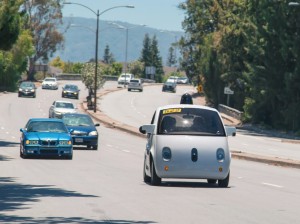Companies from Silicon Valley and the auto industry are teaming up to create a coalition to influence lawmakers and regulators, who are destined to play a huge role in shaping the deployment of autonomous vehicles.
Google, Uber and Lyft have joined forces with Volvo and Ford in establishing “The Self-Driving Coalition for Safer Streets,” which has recruited David Strickland, long-time safety watchdog and former head of the U.S. National Highway Traffic Safety Administration.
In 2014, the most recent available numbers from the NHTSA, there were 6.1 million reported crashes on U.S. roads, resulting in 2.3 million injuries and 32,675 fatalities. Advocates of self-driving cars suggest an influx of these accident-averse vehicles on to America’s roadways would greatly virtually eliminate fatal accidents.
The Self-Driving Coalition for Safe Streets basically aims to influence regulations that will keep safety front and center, but allow for rapid penetration of autonomous vehicle technology into the market.
“Self-driving vehicle technology will make America’s roadways safer and less congested,” Strickland said in a statement. “The best path for this innovation is to have one clear set of federal standards, and the Coalition will work with policymakers to find the right solutions that will facilitate the deployment of self-driving vehicles.”
(Feds expecting pushback on new autonomous vehicle rules. For more, Click Here.)
The U.S. Department of Transportation is preparing to write a set of rules this summer for autonomous vehicle and the coalition wants to see faster progress in order to stave off the possibility that there will be different regulations in each state. The goal is to work together to advocate for policy solutions that will support the deployment of fully autonomous vehicles, Ford noted in a statement.
One of the ideas the Transportation Department is considering is giving a green light self-driving vehicles that don’t have anyone behind the wheel, departing from the regulations put in place in California, which do not allow driverless vehicles and have been criticized by companies like Google.
The rule-making process is also part of the Obama administration’s effort to get more rules on the books. In January, the White House proposed $4 billion during the next decade for driverless car testing.
In March, the director of Google’s self-driving car initiative, Chris Urmson, asked Congress to “move swiftly to provide the Secretary of Transportation with new authority to approve life¬saving safety innovations,” according to The Hill.
(Click Here for details about how airlines are helping automakers with safety.)
NHTSA Administrator Mark Rosekind has suggested that the use of autonomous vehicles could eventually eliminate highway deaths in the U.S., and wants the agency to help promote development of the technology.
However, not everyone is a fan of the “full-steam ahead” approach. There are plenty of skeptics, including some safety experts, who want to slow the process down. Among those are former NHTSA Administrator Joan Claybrook, who is president-emeritus of Public Citizen, and Clarence Ditlow, executive director of the Center for Auto Safety.
They point to the fact that Google, considered to have the most advanced autonomous vehicle development program, has still run into a variety of problems. It has experienced nearly 20 crashes, though all but one were blamed on other drivers. But they also cite reports showing that during a 15-month period, the self-driving system aborted 341 times, forcing the human back-up driver to intervene.
A variety of factors caused those problems, ranging from bad weather to other reckless drivers, as well as hardware or software failures.
(To see more about the 20 automakers committing to new standard braking by 2020, Click Here.)
Warning not to let Google “blow by” federal safety rules, Harvey Rosenfield, founder of Consumer Watchdog, contends that, “NHTSA’s job is to make sure the nation’s streets and highways are safe for motorists and pedestrians, not to promote robot cars or help Google’s lobbyists circumvent the law. Before jumping on board the Google express, NHTSA should initiate a serious and careful public investigation into autonomous vehicles.”

